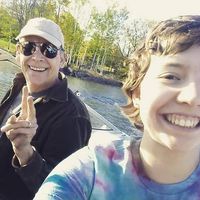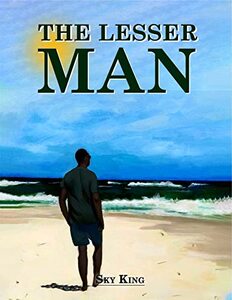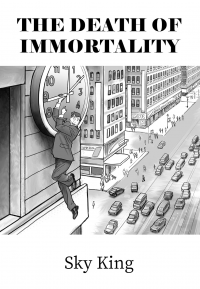Sky King Interview Published on: 19, Jan 2024
 Can you tell us a bit about yourself and your background as a special education teacher?
Can you tell us a bit about yourself and your background as a special education teacher?
I couldn’t keep a job as a twenty something. A friend of mine told me about a company that was hiring aides to teach and assist special needs children. Not just any disabled kids, but those released by court mandate from a Massachusetts state school. They weren’t just disabled. They were abused, neglected and this was to be their first step into the light of real protection. I loved them and the people who worked with them. I was home with the broken. I got it. I could help. Ten years later I had my masters and was teaching special needs preschool. (Where can you have the most impact? Ages three to five) I retired three years ago.
What inspired you to transition from teaching to becoming a full-time author?Frankly, I’m not a full time author, I’m just retired and wish to spend a great deal of my time writing. I’ve written books when I had only summers or a half hour before dinner was ready and my wife was calling my name. I’ve written books while my daughter played with her stuffies next to me in a cold upstairs room. I’ve written books hiding in the basement as well. I write, full time, part time, whatever times.
How did your experience as a special education teacher influence your writing?I received thirty three credits from an alternative University within the walls of the University of Massachusetts at Amherst. It was called, oddly enough, the University Without Walls. They gave me this near graduation credit for writing the story of my five year’s experience as an instructional aide with the deinstitutionalized kids. There were charts and graphs, humorous incidents, tragedy and would you believe it, friendship, and love. The evaluators were so relieved to read something that wasn’t as dry as the bones of Davy Crocket that I fear they went overboard in their praise and credit giving. Fron that point on I was always working on something. Even, dare I say, poetry.
Do you have a favorite genre to write in? If so, why?So many writers I’ve read about say they write because, damn it all, they can’t find anything to read and so to hell with it, I’ll write something I’d like to read. I must be some kind of demographic, right? I grew up on Jules Verne, H.G. Wells, the Hardy Boys, comic books, Mickey Spillane, the seminal detective novels, Mary Stuart, Daphne Du Murier, the Bobsey Twins (yes I read my mother’s and older sister’s books.) I loved Travis McGee and love Reacher now. I’ve read all classic Sci-Fi and then I fell off the earth for a while and couldn’t find what I wanted. I wrote a bunch of books that I wanted to read. Good thing to because I had to read them a thousand freaking times to get them right. My genres are pretty fluid, but fantasy and mystery seem to be my best work.
How has retirement affected your writing routine and creativity?Time, time time. At first I kept looking over my shoulder. Is this okay that I write for this long? Well, it took a while for permission to percolate down from the programmed stress to full enjoyment of writing. Then I had time for marketing. Of course, all I did there was to get into trouble.
Right now, my creativity is through the roof. I can’t keep track of all the projects I want to complete. I focus on two or three, and things and they are following apace. Wish me luck.
Are there common themes or messages that you find yourself exploring in your novel, "The Lesser Man"?Oh, yes. “The Lesser Man” is the antidote to the Spencer, Reacher, autonomous incredibly physically strong and courageous PI or traveling MP in Reacher’s case. The main character is beach bum who believes he is coward. When he must find out who murdered his old girlfriend, his friends rally around him. The themes in all my books are loyalty, friendship, the twists, and turns of relationship, especially in “Death of Immortality.” It is connection we all want. I’m solidly connected to all my characters, even the bad guys. I mean, why can’t they just be nice? They can’t though. Yeah, I lose control at some point and character dictates the next chapter
How do you hope your work resonates with readers, especially those with a background in education?I want them to resonate all right—away from education. Hey, colleagues, take a break. How about a low cost trip to Cape Cod to visit Paul Morris and his eccentric crew? How about a trip to Boston with Eric to see if a government black site can force him to take the treatments to live five thousand years? My friends, you can visit New Hampshire’s last ancient forest where the immigrant remnants of the Sidha( better known as Fairie) are interfering with the great betrayer of King Arthur finding the last evil enchanter and killing her before he himself can die. Come on out and play! No work. No inspiring teacher words. Escape! Or as the knights in a Money Python films said, “Run away!”
What advice would you give to aspiring writers, particularly those who are considering a career shift like yours?Of course, Dorothy Parker.
If you have any young friends who aspire to become writers, the second-greatest favor you can do them is to present them with copies of The Elements of Style. The first-greatest, of course, is to shoot them now, while they're happy. Dorothy Parker It won’t work Dorothy. I just can’t pull the trigger. We write anyway!
How important is it for writers to draw from personal experiences when crafting their stories?It is important for a writer to draw from authentic emotions. One thing about humans is we all feel the same, but not about the same things. Greed is greed, hate is hate. Love is love. All gradations are discernible whether you are a space man, PI, or a homeless person. Be honest about you. Remember everyone hurts, no exceptions. Some people just don’t know it sometimes or think they are the only ones. But in the case of the psychopath(born) and sociopath(made) we have an entirely different emotional landscape. It may even be backwards, or so numb it takes a tsunami to feel anything. In other words, it doesn’t matter what you write about. Just know your subject and be real, man.
You've written across different genres. How do you approach the challenge of switching between genres, and do you have a favorite genre to explore?My current favorite is high fantasy with a touch of SF. I am trying to find a publisher (trad) for ‘The Ten Sons of the Falcon King’ trilogy. I feel like I can’t be calculating about writing in genres. My work is driven by what I love. For instance, I’ll never write a how to book. Mostly because I don’t know how to do anything, and because DIY makes me too crazy. I won’t write non-fiction except for occasional memoir fragment, which, truth, be told, at my age, might be fiction anyway. I am passionate about writing fiction. I want to tell lies that tell a truth, create a family, bring friends into a life and death endeavor. As a front line teacher with the severely disabled I’ve been there. It was friendship love and understanding that got me through. It’s the same with old age.
Do you find yourself incorporating educational themes or lessons into your novels?Well, it could be argued that everything is educational. But no, escapism is my watch word. If someone says, “Give me a break.” I hand them my book. “Take a break, from the cortisone producers, man.” The only story I wrote related to my former profession is the eight hundred word piece below.
A Fisherman’s Guide to Autism By W. Sky King Brian held the pole with both hands, pulled back the bale with the finger closest to the black spinning reel, cocked his wrists and snapped the pole forward. The line snaked out silently in a high arc and landed in whiteness. Brian closed the bale with a half turn of the handle, set the drag with a quick twist, placed small hands six inches apart on the dual cork grips, snugged the butt end to his belt, then crouched slightly in readiness for any sudden strike. A solid white fog surrounded him. He even stood on it. At times he appeared to be upside down or maybe perpendicular by standards of normal positioning. But since there was nothing to measure position by, it was impossible to be completely sure. He only knew that wherever he cast the line went, shining and blue: a thin luminescence only partly visible. A barbed hook and a tear drop shaped weight marked the end of the line. The pole grew too heavy for the thin arms of the ten-year-old. Brian put it down by his feet (wherever they were), pushed a lock of curly brown hair from his forehead and gazed into the whiteness out of eyes gray as the North Atlantic. No one was there. He didn’t catch anything. He liked it that way. A long time passed. Neither the blank fog nor Brian changed. So, he picked up the pole again, reeled, cast, and caught nothing. Then the time came when he felt a tug at the line. He set the drag, braced and the pole bent, almost levering from his hands. Brian gripped tighter, reeled in, swung the hook to his hand and discovered a nine by twelve-inch index card with the word “Hello!” printed in four-inch high letters. Brian turned it over, looked at the blank backside, turned it upside down (as he was at the moment), then, frowning in puzzlement, cast out again. The card disappeared in whiteness and Brian breathed a sigh of relief. But before the sigh made it all the way out something tugged the line again. Brian reeled in, heart thudding, and found another nine by twelve-inch index card. This one showed a line drawing of a smiling face and a hand raised with the palm outward. The word “Hi!” was printed under it. Brian ripped the card off the hook and flung it away. It sailed in a fluttering arc and disappeared. Slowly, Brian’s heart resumed its normal rhythm. He relaxed and contemplated the blue pole: silvery eyelets tapering off to a whip end, monofilament line so thin between his fingers, line arcing out, the click click of the reel. “I have always fished,” he thought, drawing back for a cast. But a shadow fell across his face, disturbing the whiteness with its gray outline. “I have always fished!” he yelled in defiance and cast, throwing reel, pole, line, sinker and hook out into the fog. The rig tumbled end over end, sinker and hook wrapping the pole before it disappeared completely. Brian stared after it, hands already moving to the proper positions, knees bent. He stayed that way until his limbs tired. Then he straightened, dropped his arms, watched them swing and stop. His eyes moved upward, around, then widened: the fog was gone. Brian stood in a room, on a brown carpet. He wore white pajamas with little red fish all over them. A white-sheeted bed waited behind him. Pictures of fishermen catching fish covered the walls over the bed. A man stood facing him from a doorway. His body blocked light from the hallway. Brian took in a tall, thin body, baldhead, large nose, blue eyes, thick eyebrows. From thin arms hung big hands with large knuckles. Black chest hair curled from an open white shirt. He wore black slacks and shoes of gray. “Hello,” said the man. “Hello,” said Brian. “It’s time for bed,” said the man. “It’s time for bed,” said Brian. “Wash your face and brush your teeth. Can you do that?” asked the man. “Can you do that?” asked Brian. “If you do a good job I’ll take you fishing again. Would you like to go fishing?” “Yes,” said Brian. The man folded his arms across his chest and smiled. Brian folded his arms across his chest and smiled.
Can you share any details about upcoming projects or genres you're eager to explore in the future?Sure. I have a new website at skymanooks.com. All the bells and whistles. Cross fingers that someone buys a book. I’m working on a rewrite of ‘Deep Time’ an older novel which brings the modern reincarnations from the Arthurian Myth to the last ancient forest, which by the way, is in New Hampshire. The great betrayer has to find the champion in his present reincarnation, give him the sword and help him to end the last evil enchantress.
I am working on the second draft of book two of ‘The Ten Sons of the Falcon King’ and have one rejection (after a year) of the first book.
I am working on rewriting my dystopian novel called ‘Liberation City,’ which really is an end of the world novel. My take is that it doesn’t go out with a bang, but a whimper. It asks the question: What is normal if you don’t have any kind of real contrast?
How has your experience of being associated with AllAuthor been?All Author is fun. I love seeing their mock-ups and looking at what’s up with other authors. The price has been right too. You do good work!
Share Sky King's interview
Meet Sky King, a dedicated wordsmith who transitioned seamlessly from a fulfilling career as a special education teacher to a prolific full-time writer. Embracing the joy of storytelling in retirement, Sky has successfully ventured into the realm of literature, with four genre novels already published. Through a unique blend of experience and imagination, Sky King continues to captivate readers with compelling narratives.



